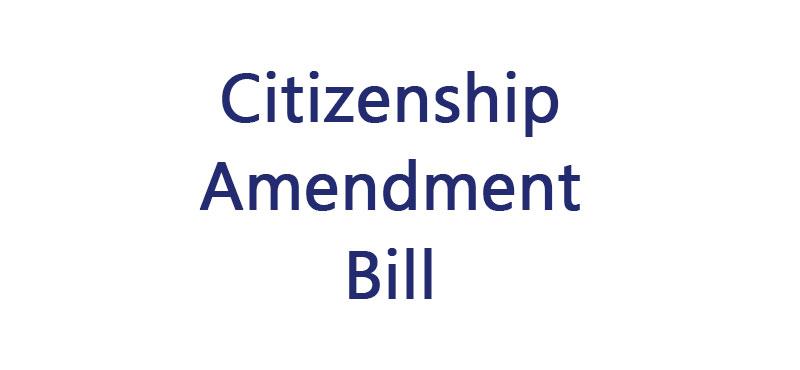
In News:
The Citizenship Amendment Bill, 2019 which grants citizenship to persecuted minorities from Bangladesh, Pakistan and Afghanistan staying in India got the approval of the Lok Sabha.
Key Features Of The Bill:
- The Bill amends the Citizenship Act, 1955.
- It now allows persecuted minorities from Bangladesh, Pakistan and Afghanistan to claim Indian citizenship.
- Persecuted minorities include people from six communities – Hindus, Jains, Parsis, Buddhists, Christians, and Sikhs.
- Members of these communities who came to India before December 31, 2014, can get Indian citizenship.
- Also, the mandatory requirement of 12 years stay in the country has been reduced to seven years for these members to be eligible for citizenship if there have no proper documentation.
- Under citizenship by naturalisation, the bill relaxed the requirements for these people from the mandatory 11 years stay in the country to six years.
- The Bill also cancels the registration of Overseas Citizens of India (OCI) cardholders if they are found to violating any law of the country.
Opposition To The Bill:
- The Bill grants citizenship on the basis of religion. This is in violation of Article 14 of the Constitution which provides right to equality for all the citizens.
- It is in a way granting Indian citizenship to illegal migrants.
- Assam and Northeast states which have the largest number of illegal migrants from Bangladesh who crossed over after March 1971 fear that granting citizenship will destroy their social fabric and their livelihoods.
- Also, the bill is in violation of the Assam Accord of 1985.
- Opposition parties call the bill as divisive and as vote-bank politics.
Government’s Response To the Opposition:
- On its part, the government said that the burden of these people will not be Assam’s alone and all the states of India will share the burden.
- Counter Point: But not all states are forthcoming to share the burden.
The Assam Accord:
- The accord was signed in 1985 between the government of India and members of the Assam Movement.
- The movement demanded identification and deportation of illegal migrants from Assam who entered the state from Bangladesh.
The Citizenship Act, 1955:
The Act regulates the Indian citizenship on four grounds. These include:
Through Naturalisation:
An ordinary person residing in India for 12 years and a continuous stay for 12 months preceding the date of application (11 years aggregate) will be granted citizenship by naturalisation.
Through Descent:
- A person is a citizen of India who is born outside India on or after January 26, 1950, if his/her father was an Indian citizen by birth.
- A person born outside India on or after December 10, 1992, but before December 3, 2004, if either of his/her parents was an Indian citizen by birth.
- If a person born outside India on or after December 3, 2004, has to acquire Indian citizenship, his/her parents have to declare that the minor does not hold the passport of any other country and his/her birth is registered at an Indian consulate within 1 year of his/her birth.
Also Read: SC And HC Judges Retirement Ages
By Birth:
- Irrespective of their nationality, any person born in India on or after 26-01-1950 but before 1-07-1987 is a citizen of India.
- Any person born in India between 1-07-1987 and 2-12-2004 is a citizen of India given his/her parents are citizens of India at the time of a person’s birth.
- Every person who is born after 3-12-2004 is a citizen of India given both the parents are Indians or at least one parent is a citizen of India and the other one is not an illegal migrant at the time of birth.
By Registration:
- A person of Indian origin who has been a resident of India for seven years before applying for registration in the country.
- A person of Indian origin who is a resident of any other country outside undivided India.
- A person who is married to an Indian citizen and is ordinarily resident for seven years before applying for registration in the country.
- Minor children are also eligible whose parents are citizens of India.
Also Read: The Merger Of Three Public Sector Banks: BOB, Vijaya Bank And Dena Bank
Conclusion:
Though the Bill still has to pass the Rajya Sabha test, if passed, the central government along with state government’s will have to take appropriate steps in dissuading the apprehensions of the people from these states especially from Assam and other Northeast states.
Also, it is to be seen whether the bill once cleared by the Parliament will overcome the scrutiny of the Supreme Court if challenged.

Leave a Reply
You must be logged in to post a comment.